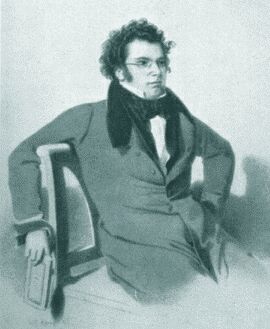

|
|
|
Über allen Gipfeln Ist Ruh'. In allen Wipfeln Spürest du Kaum einen Hauch. Die Vöglein schweigen im Walde. Warte nur, warte nur, balde Ruhest du auch. |
Silence rests upon All peaks. In all treetops You sense Hardly a breath. The birds are silent in the woods. Wait, yes, only wait, soon You will rest, too. |
|
Franz Peter Schubert (1797-1828) |
 Painting by Wilh. Aug. Rieder, 1825 (Bildarchiv der Österr. Nationalbibliothek, Wien) |
In an organic development of the web pages on the subject of Beethoven and other Composers, I came, in the course of my translation of Wagner's Beethoven essay of 1870, across his concept that only drama is really akin to music and that, in the combination of vocal and instrumental music, even the texts of the greatest poets find less attention than the music itself, as far as they do not form a dramatic unity in Wagner's sense, as it grew in him out of his understanding of the choral ending of Beethoven's Ninth Symphony. As best counter-argument that this does not always have to be so, Franz Schubert's body of lieder works came immediately to my mind. I also have to honestly admit that only through this detour via Wagner did I gain access to the present presentation of Schubert in connection with Beethoven.
While you can listen here to the Schubert-Lied The Wanderer's Night Song II to Goethe's poem, you will be able to follow this counter-argument through a practical example (for which I have also provided you with the German text and my near-literal translation into English of it, at the top). However, in order to approach Schubert in an organic, harmonious process, I want to embark on this journey here with the help of Robert Schumann in presenting his famous essay "The C-major Symphony of Franz Schubert" that had appeared in his periodical, Neue Zeitschrift für Musik, for the first time in 1840 (in the aftermath of the Leipzig premiere of this symphony under the baton of Felix Mendelssohn at the Gewandhaus on March 22, 1939) in order to, so-to-say, work our way from the late (musical) romantic Wagner via and by means of the full-blooded romantic Schumann to the early romantic Schubert.
Without wanting to pre-empt Schumann's comments on Schubert's masterwork that, these days, is also counted as 'his' Ninth Symphony, it might, even for a lay writer such as myself, not be too daring to state that Schumann's comments that he makes in it in comparing the symphonic work of Beethoven and Schubert should promise some interesting reading!
Therefore I wish you a great deal of reading and listening enjoyment with the topic of Beethoven and Schubert, to which two new sections have been added as announced below and to which we will add new material in due course!
Robert SchumannSCHUMANN'S ARTICLE ON SCHUBERT'S C-MAJOR-SYMPHONY
Read here how Robert Schumann re-discovered this symphony in Vienna, what impression it first made on him and subsequently on the Leipzig public!
Franz SchubertSCHUBERT TIME TABLE
This concise time table offers you Schubert facts at a glance.
Beethoven in 1824SCHUBERT AND BEETHOVEN
Did they know each other? Have they ever met? Find out more about it in this section!
BACK TO THE COMPOSERS' PAGE!
BACK TO THE MAIN PAGE!